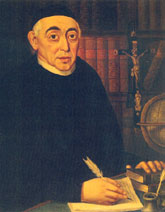|
|
|
|
Francisco Contente Domingues
|
Teodoro de Almeida (1722-1804)
Teodoro de Almeida, propagator of Natural Philosophy
 |
|
|
|
Teodoro de Almeida (1722-1804)
|
|
|
|
Born of a family of modest social standing in Lisbon, Teodoro de Almeida entered the Casa do Espírito Santo da Congregação do Oratório on 11 April 1735, possibly due to the protection of the prelate of the Casa, Domingos Pereira. He then started his studies under the direction of João Baptista, the author of Philosphia Aristotelica Restituta, who influenced him in a decisive manner, giving rise to his interest in Natural Philosophy.
In 1748, he substituted the master in charge of the Philosophy triennial, father Luís José, being responsible for lecturing this subject as from 1751. In the same year, the first two volumes of his most important work Recreação Filosófica were published.
The decade of 1750 was the period of full affirmation of Teodoro de Almeida, who gained growing prestige as a preacher, but above all as a writer and propagator of scientific topics. The volumes of the Recreação followed each other at a dizzy pace, with the sixth volume being published in 1762. In 1752, father João Baptista started his conferences on Experimental Philosophy – or Natural Philosophy – at the Casa das Necessidades, benefiting from the excellent equipment of the laboratory donated to the Congregation by D. João V, in which his disciple would come to play a leading role. The conferences were open to the public and were a success, bringing in an audience of more than 400 people, among which was the monarch himself. Nevertheless, the phenomenon owed much to the curiosity of the large hall, although not everyone was aware of what was really involved from the scientific point of view.
While exponent of this popularity of scientific dissemination, Almeida was the object of criticism and controversy, having been accused of deviations in relation to the religious orthodoxy and of being a plagiarist. Of those that came to his defence, the most eminent person was perhaps the Jesuit Inácio Monteiro, author of an important pedagogical work himself.
In the following decade, some of the most influential Oratorians were subjected to the persecution of the Marquis of Pombal. Teodoro de Almeida was forced to go into exile in 1768, continuing to develop an important pedagogical activity in France. He returned to Portugal in 1778, immediately after the withdrawal of Carvalho e Melo, becoming totalled absorbed in the ensuing years in the revitalisation of the Oratory, in writing and in the courses.
He was also one of the members of the group that organised the creation of the Academia das Ciências de Lisboa, which was presented to the public with an Oração de Abertura of his authorship, proffered on 4 July 1780. In this opening address, he compared the backwardness of the country in scientific terms to the kingdom of Morocco, giving rise to a violent reaction of the intellectual sectors connected to the Pombal regime, expressed in several anonymous letters that railed against the orator and the new Academy.
He subsequently continued the Recreação, concluding its editorial plan with the publication of volume X in the year 1800. This last phase, however, was dominated by a conservatism that reacted to the political repercussions of the policies of the “ideals of Lights”, which was his in a first phase until he started questioning the religion proclaimed and the social order in force, to which he was strongly bound, although far from its ultramontane component. He expressed himself against non-believers, for the conservation of their religious ideas, as in the past he had pronounced himself against the scholastics, for renewing their scientific ideals.
The most important part of the work was the major encyclopaedic project that was the Recreação Filosófica (with volumes I to VI on Natural Philosophy, volume VII on Logic and the last three on Ethics and Moral), complemented by the Cartas Físico-Matemáticas (3 vols., 1784-1798), this being the work that he took further and at the same time marked the limits of the possibilities of the Portuguese catholic illustration. Besides these works, he left many others, such as Feliz Independente do Mundo e da Fortuna (3 vols., com 2nd ed. corrected in 1786), his most famous book on spirituality.
Bibliography
Domingues, Francisco Contente, Ilustração e Catolicismo. Teodoro de Almeida, Lisboa, Colibri, 1994.
Santos, Zulmira, Literatura e espiritualidade na obra de Teodoro de Almeida (1722-1804), Diss. de Doutoramento, Univ. do Porto, 2002.
|
|